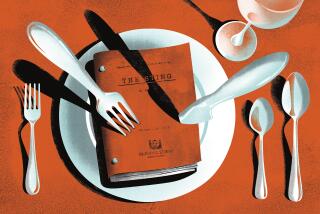Discoveries: ‘Everything Here Is the Best Thing Ever’
Everything Here Is
the Best Thing Ever
Stories
Justin Taylor
HarperPerennial: 184 pp., $13.99 paper
Amber was a “weather freak”; Ma was a “real banshee for Christ.” These are characters in two very different stories, and Justin Taylor is a master of the modern snapshot. His characters are recognizable formations in our cultural landscape. Sometimes they disappear into the future -- we see only their backs. “I got a life ahead of me,” Cass says, “not this.” The “I” in these stories is often a guilty blur: “In my heart I have already left this miserable town behind for a place and future so bright with promise I cannot look directly upon it.” What are they running from?
Sometimes it’s the Charlie Brown grown-ups droning in the backgrounds of the stories, adults with their myriad sins of omission. Woven into Taylor’s sentences is the certainty that few of his characters will ever really escape to a different life. A group of students sit around burning books in the backyard -- Derrida, Nietzsche, the Norton Shakespeare: “The anarchists were drinking victory shots and making toasts because even though they’d never met with success before they surely knew it when they saw it or it found them.”
The Art of Eating In
How I Learned to Stop Spending and Love the Stove
Cathy Erway
Gotham Books: 318 pp., $24
Another good book born from a blog: This can’t go on, can it? Cathy Erway’s blog, noteatingoutinny.com, was born in 2006 in a Brooklyn beer garden. The author, 26, had just been laid off. She shared an apartment with two roommates. Not eating out in New York seemed a kind of sacrilege -- it reminded her of the time a professor told her class to go on a media fast and record the results. “In this town, you could eat a bagel or bialy with lox for breakfast, a stuffed dosa from that amazing street cart for lunch, bistro steak frites for dinner, and for late-night eats, a steaming bowl of ramen or a mean slice of real New York pizza, all within the radius of a few blocks.”
Erway’s no-restaurant fast lasts two years, and she collects recipes from friends whose families come from all over the world. She goes to underground supper clubs, enters local bread-making competitions, goes Dumpster-diving with frugalistas and experiments with wild edibles found in Prospect and Central parks. She moves in with her boyfriend, acquires new appliances and then moves out. She barely minds living alone -- she looks forward to a bowl of noodles with spicy sauce, or a tenderloin steak and wasabi mashed potatoes cooked just for one. It is, as food critic Robert Sietsema writes in his introduction, a “Portrait of the Artist as a Young Cook,” an insight into Brooklyn’s youth culture. And it looks -- breakups, tiny kitchens and all -- like fun.
This Book Is Overdue!
How Librarians and Cybrarians Can Save Us All
Marilyn Johnson
HarperCollins: 270 pp., $24.99
It is “a profession in the midst of an occasionally mind-blowing transition,” Marilyn Johnson writes of the librarian’s role in history. “A library is a place to go for a reality check, a bracing dose of literature . . . whether it’s a brick-and-mortar building . . . or a fanciful arrangement of computer codes. The librarian is the organizer, the animating spirit behind it. . . . Her job is to create order out of the confusion of the past, even as she enables us to blast into the future.” Librarians are soldiers for truth, universal literacy and privacy. They are the democrats of the computer age, providing citizens who have no other access to the Internet or other cyber tools with information and opportunity. They are organizers for the greater good, creating vital links for social justice movements around the world. It is a discreet profession, Johnson writes, yet full of stereotypes that irritate most librarians. Johnson describes the ground shifting beneath their feet, the constant changes in software and information processing, the dependence on IT guys. Johnson describes wonderful scenes on a virtual site where librarians meet, help each other, crack jokes and discuss their profession. She captures the feeling of pure freedom one has in a library and the feeling of being watched over by angels: “They want to help us. They want to be of service. And they’re not trying to sell us anything.”
Salter Reynolds is a writer in
Los Angeles.
More to Read
The biggest entertainment stories
Get our big stories about Hollywood, film, television, music, arts, culture and more right in your inbox as soon as they publish.
You may occasionally receive promotional content from the Los Angeles Times.






